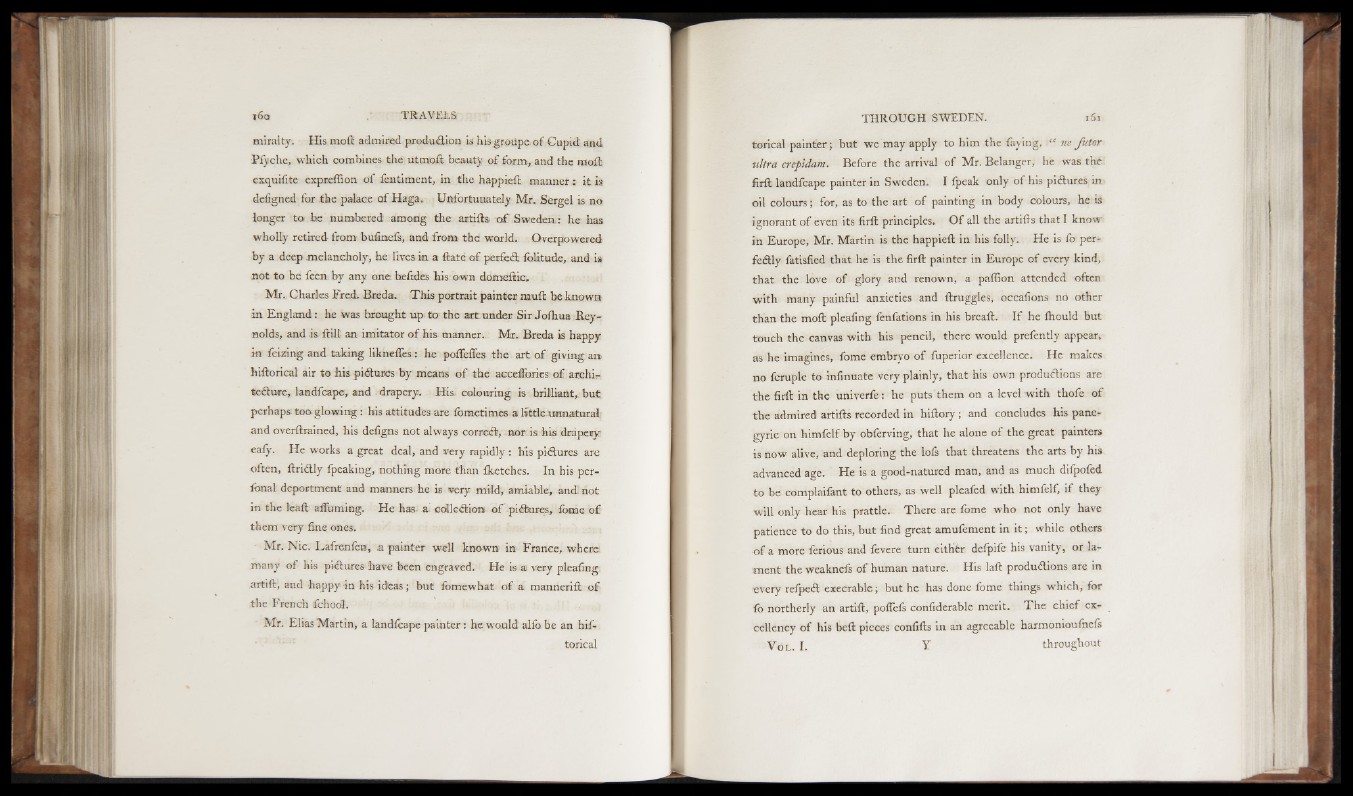
miralty. His moft admired production is hisgroupe o f Cupid and
Pfyche, which combines the utmoft beauty o f form, and the moft
exquifite expreflion o f fentiment, in the happieft manner: it is
defigned for the palace o f Haga. Unfortunately Mr. Sergei is no
longer to he numhered among the artifts. o f Sweden : he has
wholly retired from bufinels, and from the world. Overpowered
by a deep melancholy, he lives in a ftate o f perfeCt folitude, and is
not to be feen by any one hefidcs his own donreftic,
Mr. Charles Fred. Breda. This portrait painter muft be known
in England: he was brought up- to the act under Sir Joihua Reynolds,
and is ftill an imitator o f his manner. Mr. Breda is happy
in feizing and taking likneffes.: he poffeffes the art o f giving am
hiftorical air to his pictures by means o f the accefforics o f architecture,
laadfcape, and drapery. His. colouring is brilliant, but
perhaps-too. glowing : his attitudes are fometimes a little unnatural:
and overftrained, his defigns not always correit, nor is his drapery
eafy. He works a great deal, and very rapidly: his pictures are
often, ftriClly fpeaking, nothing more than fketches. In his per-
fonal deportment and manners he is very mild; amiable; and not
in the feaft affirming. He has- a cdtleCtkn* o f pictures, fome o f
them very fine ones.
Mr. Nic. Lafrenfen, \a painter well known in France, where
many o f his pictures have been engraved. He is a very pleating
artift, and happy in his ideas; but fomewhat o f a mannerift o f
the French fchool.
Mr. Elias Martin, a landfcape painter: he would alfo be an hiftorical
torical painter; but we may apply to him the faying, “ ne futor
ultra crepidam. Before the arrival o f Mr. Belanger, he was the
firft landfcape painter in Sweden. I fpeak only o f his pictures in
oil colours; for, as to the art o f painting in body colours, he is
ignorant o f even its firft principles. O f all the artifts that I know
in Europe, Mr. Martin is the happieft in his folly. He is fo perfectly
fatisfied that he is the firft painter in Europe o f every kind,
that the love o f glory and renown, a paffion attended often
with many painful anxieties and ftruggles, occafions no other
than the moft pleafing fenfations in his breaft. I f he fhould but
touch the canvas with his pencil, there would prefently appear,
as he imagines, fome embryo o f fuperior excellence. He makes
no fcruple to infinuate very plainly, that his own productions are
the firlt in the univerfe: he puts them on a level w ith thofe o f
the admired artifts recorded in hiftory ; and concludes his panegyric
on himfelf by obferving, that he alone o f the great painters
is now alive, and deploring the lofs that threatens the arts by his
advanced age. He is a good-natured man, and as much difpofed
to be complaifant to others, as well pleafod with himfelf, i f they
will only hear his prattle. There are fome who not only have
patience to do this, but find great amufement in i t ; while others
o f a more ferious and fevere turn either defpife his vanity, or lament
the weaknels o f human nature. His laft productions are in
every refpeCt execrable; but he has done fome things which, for
fo northerly an artift, poffefs confiderable merit. T h e chief excellency
o f his beft pieces confifls in an agreeable harmonioufnefs
V o l . I. Y throughout